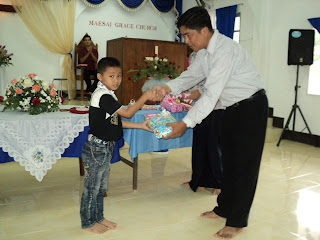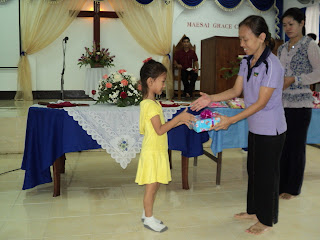A Shan migrant who spent two-and-a-half years in Chiang Mai Prison, Thailand, charged with rape and murder is attempting to get compensation after he was freed in late July.
Sai Nueng (Pseudonym) was originally from Burma's southern Shan State but migrated to Thailand to support his family over ten years ago. He worked as a construction worker in Mae Hong Son, northern Thailand, when he first arrived but later moved to Chiang Mai in search of better wages and job opportunities.
He requested that The Irrawaddy uses a pseudonym because he remains worried about possible police reprisals.
In early 2009, a student from Mae Jo University, Chiang Mai, was raped and murdered and Sai Nueng was placed under arrest for the crime along with another Shan migrant called Sai Bueak.
A court found Sai Bueak guilty and he was sentenced to 25 years imprisonment.
Speaking to The Irrawaddy on Tuesday, Sai Nueng said, “A cop came to me where I go fishing and asked for my ID. When he saw my name, he talked about the case and I said I don’t know anything about it. Then he left. A few minutes later, four or five cops came and beat me down and covered my head with a black bag. Then they brought me to a police station.”
He said that until he arrived at the police station, he had no idea why he was arrested. He presumed the problem was just concerning his ID as he was registered as living in Mae Hong Son. However, he soon learned the truth in the police interrogation room.
Officers tied him to a chair and beat him as they had done since arriving at the police station. Sai Nueng said that four or five policemen attacked him, but he did not know who because his head was still covered by a black bag.
The cops even pointed a pistol to his head and forced him to admit to the murder and tried to get his thumb print by force. He said his clothes were removed by the police and head kicked many times. When he lost consciousness, the police poured water on him and continued their savage treatment.
Sai Nueng said that the scars are still on his body today.
Even though Sai Bueak, who confessed to committing the crime, told the police that the case did not concern Sai Nueng, officers still forced him to admit that he was involved.
Sai Nueng said, “Actually I was wrongfully arrested by the police. Sai Bueak and [another man who shared my name] committed the crime together, but this different [Sai Nueng] disappeared after the crime.”
After he spent three nights at the police station, he was sent to the main prison of Chiang Mai where the beatings continued at the hands of correction officers.
A lawyer from Migrant Assistance Program (MAP) Foundation and two lawyers from Bangkok's Lawyers’ Council represented Sai Nueng in court.
MAP Foundation lawyer Joe said that although it should not have been a difficult case, it actually proved to be quite tricky. He and the two other lawyers conducted research about Sai Nueng and collected testimony from Sai Bueak to be submitted to the court.
Speaking to The Irrawaddy on Tuesday, Joe said, “The court was not the problem in this case. Thai laws are equal for everyone, but the main problem was the police. If they had done the right thing, no problems would have occurred.”
He added that there are a few stages in the process of requesting compensation, and in Sai Nueng's case the facts are in line with receiving a payout. However, he did not know how long it would take to get compensation.
Even though on paper Thai law is supposed to be equal for everyone, many migrants feel they face discrimination based on their nationality and immigration status.
From: Irrawaddy
Sai Nueng (Pseudonym) was originally from Burma's southern Shan State but migrated to Thailand to support his family over ten years ago. He worked as a construction worker in Mae Hong Son, northern Thailand, when he first arrived but later moved to Chiang Mai in search of better wages and job opportunities.
He requested that The Irrawaddy uses a pseudonym because he remains worried about possible police reprisals.
In early 2009, a student from Mae Jo University, Chiang Mai, was raped and murdered and Sai Nueng was placed under arrest for the crime along with another Shan migrant called Sai Bueak.
A court found Sai Bueak guilty and he was sentenced to 25 years imprisonment.
Speaking to The Irrawaddy on Tuesday, Sai Nueng said, “A cop came to me where I go fishing and asked for my ID. When he saw my name, he talked about the case and I said I don’t know anything about it. Then he left. A few minutes later, four or five cops came and beat me down and covered my head with a black bag. Then they brought me to a police station.”
He said that until he arrived at the police station, he had no idea why he was arrested. He presumed the problem was just concerning his ID as he was registered as living in Mae Hong Son. However, he soon learned the truth in the police interrogation room.
Officers tied him to a chair and beat him as they had done since arriving at the police station. Sai Nueng said that four or five policemen attacked him, but he did not know who because his head was still covered by a black bag.
The cops even pointed a pistol to his head and forced him to admit to the murder and tried to get his thumb print by force. He said his clothes were removed by the police and head kicked many times. When he lost consciousness, the police poured water on him and continued their savage treatment.
Sai Nueng said that the scars are still on his body today.
Even though Sai Bueak, who confessed to committing the crime, told the police that the case did not concern Sai Nueng, officers still forced him to admit that he was involved.
Sai Nueng said, “Actually I was wrongfully arrested by the police. Sai Bueak and [another man who shared my name] committed the crime together, but this different [Sai Nueng] disappeared after the crime.”
After he spent three nights at the police station, he was sent to the main prison of Chiang Mai where the beatings continued at the hands of correction officers.
A lawyer from Migrant Assistance Program (MAP) Foundation and two lawyers from Bangkok's Lawyers’ Council represented Sai Nueng in court.
MAP Foundation lawyer Joe said that although it should not have been a difficult case, it actually proved to be quite tricky. He and the two other lawyers conducted research about Sai Nueng and collected testimony from Sai Bueak to be submitted to the court.
Speaking to The Irrawaddy on Tuesday, Joe said, “The court was not the problem in this case. Thai laws are equal for everyone, but the main problem was the police. If they had done the right thing, no problems would have occurred.”
He added that there are a few stages in the process of requesting compensation, and in Sai Nueng's case the facts are in line with receiving a payout. However, he did not know how long it would take to get compensation.
Even though on paper Thai law is supposed to be equal for everyone, many migrants feel they face discrimination based on their nationality and immigration status.
From: Irrawaddy

































